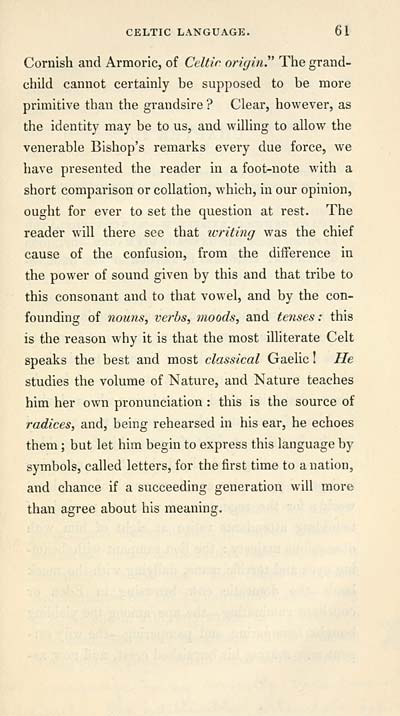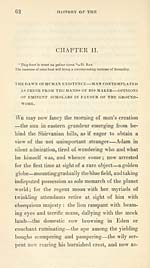Download files
Complete book:
Individual page:
Thumbnail gallery: Grid view | List view

CELTIC LANGUAGE. 61
Cornish and Armoric, of Celtic origin.^' The grand-
child cannot certainly be supposed to be more
primitive than the grandsire ? Clear, however, as
the identity may be to us, and willing to allow the
venerable Bishop's remarks every due force, we
have presented the reader in a foot-note with a
short comparison or collation, which, in our opinion,
ought for ever to set the question at rest. The
reader will there see that writing was the chief
cause of the confusion, from the difference in
the power of sound given by this and that tribe to
this consonant and to that vowel, and by the con-
founding of nouns, verbs, moods, and tenses: this
is the reason why it is that the most iUiterate Celt
speaks the best and most classical Gaelic ! He
studies the volume of Nature, and Nature teaches
him her own pronunciation : this is the source of
radices, and, being rehearsed in his ear, he echoes
them ; but let him begin to express this language by
symbols, called letters, for the first time to a nation,
and chance if a succeeding generation will more
than agree about his meaning.
Cornish and Armoric, of Celtic origin.^' The grand-
child cannot certainly be supposed to be more
primitive than the grandsire ? Clear, however, as
the identity may be to us, and willing to allow the
venerable Bishop's remarks every due force, we
have presented the reader in a foot-note with a
short comparison or collation, which, in our opinion,
ought for ever to set the question at rest. The
reader will there see that writing was the chief
cause of the confusion, from the difference in
the power of sound given by this and that tribe to
this consonant and to that vowel, and by the con-
founding of nouns, verbs, moods, and tenses: this
is the reason why it is that the most iUiterate Celt
speaks the best and most classical Gaelic ! He
studies the volume of Nature, and Nature teaches
him her own pronunciation : this is the source of
radices, and, being rehearsed in his ear, he echoes
them ; but let him begin to express this language by
symbols, called letters, for the first time to a nation,
and chance if a succeeding generation will more
than agree about his meaning.
Set display mode to: Large image | Transcription
Images and transcriptions on this page, including medium image downloads, may be used under the Creative Commons Attribution 4.0 International Licence unless otherwise stated. ![]()
| Early Gaelic Book Collections > Blair Collection > History of the Celtic language > (67) |
|---|
| Permanent URL | https://digital.nls.uk/76179346 |
|---|
| Description | A selection of books from a collection of more than 500 titles, mostly on religious and literary topics. Also includes some material dealing with other Celtic languages and societies. Collection created towards the end of the 19th century by Lady Evelyn Stewart Murray. |
|---|
| Description | Selected items from five 'Special and Named Printed Collections'. Includes books in Gaelic and other Celtic languages, works about the Gaels, their languages, literature, culture and history. |
|---|

